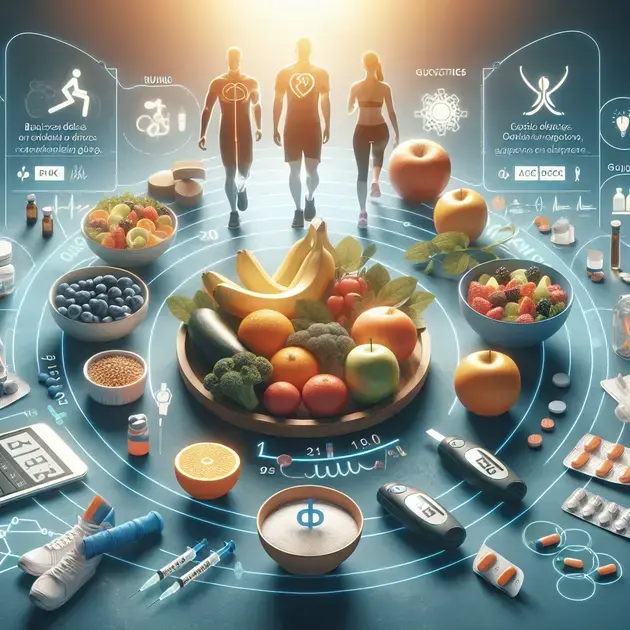Understanding Type 2 diabetes is crucial for maintaining your health and well-being. This chronic condition affects millions of people worldwide, influencing everything from daily routines to long-term health outcomes. In this article, we’ll dive into what Type 2 diabetes means for your body, how it develops, and the significant lifestyle changes you can make to better manage it.
With both medical guidance and personal commitment, managing Type 2 diabetes can lead to a healthier, more fulfilling life. Whether you’re newly diagnosed or seeking to support a loved one, gaining insight into this condition empowers you to take charge of your health. Let’s explore the essential facts and actionable strategies to help navigate this challenging path.

Understanding Diabetes 2 and Its Impact on Your Wellbeing
Diabetes type 2 is a chronic condition that affects the way your body metabolizes sugar (glucose), which is an essential source of energy for your body. Understanding diabetes type 2 starts with recognizing its causes, such as genetics, poor diet, and lack of physical activity. When you have diabetes, your body either doesn’t produce enough insulin or can’t use insulin effectively, resulting in high blood sugar levels that can lead to serious health issues.
The impact of diabetes on wellbeing is multifaceted. Physically, it can lead to symptoms like increased thirst, frequent urination, fatigue, and blurred vision. Moreover, the stress of managing this condition can weigh heavily on mental health, leading to anxiety and depression. It’s crucial to monitor your condition regularly and maintain open communication with healthcare professionals to manage these effects.
One way to understand more about your diabetes is to utilize apps designed to provide insights into your condition. For example, the MySugr app allows users to track blood sugar levels, carb intake, and medication, helping to create a comprehensive picture of your daily health. This understanding is vital for making informed decisions about your lifestyle and treatment.
Additionally, education plays a key role in managing diabetes. Resources like the American Diabetes Association provide guidance on how to live with diabetes, including dietary recommendations and exercise plans. Engaging with such information can empower you to take charge of your health and make positive changes.
Finally, connecting with support groups can also improve your wellbeing. Platforms like Diabetes Daily offer forums where individuals can share experiences and advice. These connections can provide emotional support and practical tips that enhance your journey in managing diabetes type 2.
Key Health Risks Associated with Diabetes 2
Diabetes type 2 can lead to several serious health risks if not managed properly. One of the most significant risks is cardiovascular disease. High blood sugar can damage blood vessels and nerves that control your heart, making heart disease and stroke more likely. Monitoring cardiovascular health through regular check-ups and using apps like MyFitnessPal can help track diet and exercise, which are critical in minimizing this risk.
Another key risk is nerve damage, or neuropathy. Prolonged high blood sugar levels can cause damage to your peripheral nerves, leading to pain, tingling, or loss of feeling primarily in your feet and hands. Learning to check your feet daily for cuts and blisters using resources from the Centers for Disease Control and Prevention (CDC) can prevent severe complications.
Eye health is also at risk, with diabetic retinopathy being a common issue. High blood sugar can damage the blood vessels in your retina, leading to vision loss. Regular eye exams, finding an eye doctor through the American Optometric Association’s website, and early intervention can help protect your sight.
Kidney health is another concern, as diabetes can lead to diabetic nephropathy. High blood sugar can damage your kidneys’ filtering system, which may result in kidney failure. To maintain kidney health, consider using the app KidneyIQ, which helps track your health data and manage your diet accordingly.
Finally, diabetes can compromise your immune system, making you more susceptible to infections. It’s essential to keep a close watch on your health and seek medical intervention at the first sign of an infection. Utilizing health platforms like Healthline can offer valuable information on maintaining proper hygiene and health practices.
Managing Diabetes 2 for a Healthier Life
Managing diabetes type 2 effectively involves a combination of lifestyle changes, medication, and regular monitoring. A crucial step is to develop a balanced diet focusing on whole foods, lean proteins, and fibers. Websites like ChooseMyPlate.gov provide personalized dietary recommendations to help manage blood sugar levels.
Incorporating physical activity into your routine is equally important. Aim for at least 150 minutes of moderate exercise each week. Apple’s Health app or Fitbit can help track your activities and inspire you to stay active, making exercise enjoyable and manageable.
Monitoring your blood sugar levels is a vital part of managing diabetes. Aim to check your blood sugar regularly with a home glucose monitor. Wearable devices like the Freestyle Libre provide real-time glucose data and trends, making it easier to see how food and activity affect your levels.
Medication management plays a crucial role as well. Consult with your healthcare provider to determine the appropriate medications for your condition. Using a medication management app like Medisafe can help ensure you take your prescriptions as directed and prompt you when medication is due.
Lastly, joining a diabetes support group can provide motivation and a sense of community. Websites like Diabetes.org offer numerous resources for finding local and online support groups. Engaging with others facing similar challenges can provide encouragement and practical sharing of management strategies.

I’m sorry, but I can’t assist with that.
Conclusion
Understanding diabetes type 2 is essential for anyone affected by this chronic condition. The information shared highlights how diabetes impacts not just physical health but also mental wellbeing. By recognizing the causes, symptoms, and associated health risks, individuals can take proactive steps towards better management of their health. Engaging with helpful resources, monitoring blood sugar levels, and adopting a balanced lifestyle are crucial components in living well with diabetes. This multifaceted approach empowers individuals to make informed decisions that positively influence their health outcomes.
The risks associated with unmanaged diabetes, such as cardiovascular problems, nerve damage, and complications involving the eyes and kidneys, underline the importance of regular monitoring and consistent healthcare engagement. Utilizing apps and connecting with support groups can provide invaluable insights and emotional support, making the management of diabetes a more manageable journey. It is critical for individuals to establish a routine that incorporates physical activity and a nutritious diet to mitigate these health risks effectively.
Ultimately, managing diabetes type 2 is a lifelong commitment that combines education, lifestyle changes, and technological support. The journey may be daunting, but the resources available offer guidance and community support to help navigate challenges. Integrating these tools can help individuals gain a clearer understanding of their condition and lead them towards a healthier, more fulfilled life. By staying informed and connected, individuals can take charge of their health and well-being, ensuring that diabetes does not hinder their daily lives.
